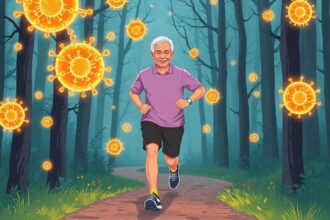Exploring how meal timing, aligned with the body’s internal clock, can optimize athletic performance and recovery through chrono-nutrition strategies.
Chrono-nutrition leverages the body’s circadian rhythms to enhance athletic performance and recovery through strategic meal timing.
Introduction to Chrono-Nutrition
Chrono-nutrition is an emerging field that studies how the timing of meals interacts with the body’s internal clock, or circadian rhythms, to influence health and performance. According to Dr. John Hawley, a leading expert in exercise metabolism, Nutrient timing is not just about what you eat, but when you eat it.
This concept is particularly relevant for athletes, whose performance and recovery depend heavily on optimal nutrient utilization.
The Science Behind Circadian Rhythms and Nutrient Metabolism
Circadian rhythms regulate various physiological processes, including metabolism, hormone secretion, and muscle repair. A study published in the Journal of Applied Physiology found that insulin sensitivity, which affects how efficiently the body processes carbohydrates, peaks in the morning and declines throughout the day. This suggests that consuming carbohydrates earlier in the day may enhance energy availability for workouts.
Pre-Workout Nutrition: Fueling for Performance
Pre-workout meals should be timed to ensure peak energy levels during exercise. Research from the International Journal of Sport Nutrition and Exercise Metabolism recommends consuming a balanced meal containing carbohydrates, protein, and fats 2-3 hours before exercise. For early morning workouts, a smaller, easily digestible snack 30-60 minutes prior can suffice.
Intra-Workout Nutrition: Sustaining Energy
During prolonged exercise, maintaining energy levels is crucial. A study in the Journal of Sports Sciences highlights the benefits of consuming carbohydrates and electrolytes during endurance activities lasting more than 60 minutes. This helps prevent fatigue and supports sustained performance.
Post-Workout Nutrition: Recovery and Repair
Post-exercise nutrition is vital for muscle repair and glycogen replenishment. The American College of Sports Medicine recommends consuming a combination of protein and carbohydrates within 30 minutes of completing a workout. This window of opportunity maximizes nutrient uptake and accelerates recovery.
Circadian Rhythms and Muscle Repair
Muscle repair and growth are influenced by circadian rhythms. A study in Cell Metabolism found that muscle cells are more responsive to protein intake during the day, suggesting that evening workouts may require adjusted recovery strategies.
Practical Meal Plans for Athletes
Tailoring meal plans to an athlete’s schedule and type of training is essential. For endurance athletes, a high-carbohydrate breakfast can fuel long training sessions, while strength trainers may benefit from protein-rich meals post-workout. Consulting a sports nutritionist can help create individualized plans.
Conclusion: The Future of Chrono-Nutrition in Sports
Chrono-nutrition holds immense potential to revolutionize athletic training and recovery. By aligning meal timing with circadian rhythms, athletes can optimize energy, performance, and recovery. As Dr. Hawley aptly states, The future of sports nutrition lies in understanding the intricate dance between time and nutrients.




